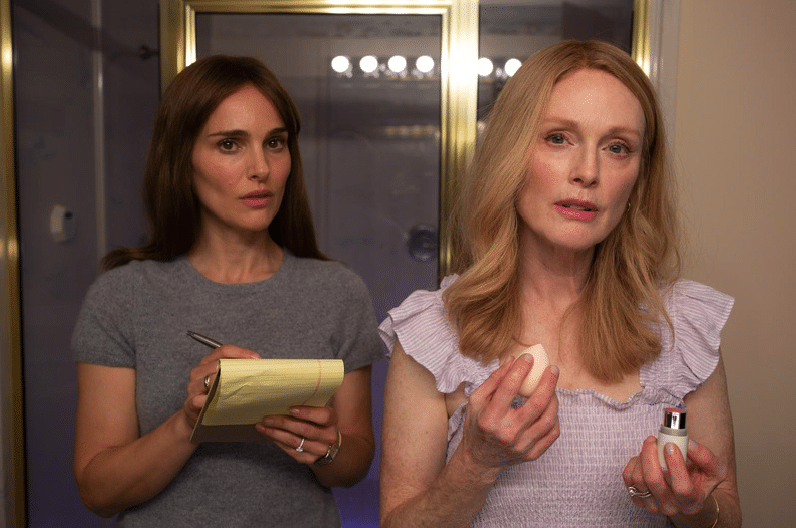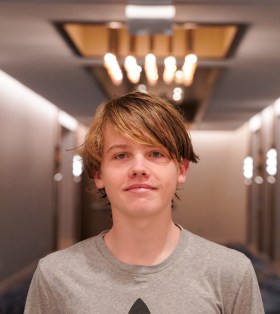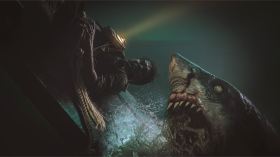Melbourne International Film Festival (MIFF) has announced its full 2023 program, with 267 films, which it describes as ‘an extraordinary selection of features, shorts, restorations, retrospectives and XR experiences’.
Gala screenings
Leading the Gala line-up is the International Premiere of the Premiere Fund-supported Shayda, which launches MIFF 2023 as the Opening Night Gala feature on Thursday 3 August. Written and directed by Tehran-born, Australian-raised MIFF Accelerator Lab alumna Noora Niasari, and executive-produced by Cate Blanchett’s Dirty Films, Shayda will be introduced to Australian audiences for the first time off the back of its Audience Award win at Sundance earlier this year.
The following week will see the World Premiere of the much anticipated rock ‘n’ roll doc, Ego: The Michael Gudinski Story in a festival-first Music on Film Gala screening on Thursday 10 August. The definitive account of the life and legend of Australian rock royalty Michael Gudinski, Ego is both a rollicking personal story of the one-man music promoting machine and a rip-roaring record of the artists he helped rocket to the top of the charts; the star-studded interview roll-call it includes features Kylie Minogue, Dave Grohl, Sting, Ed Sheeran, Bruce Springsteen, Billy Joel, Jimmy Barnes, and more.
MIFF’s Closing Night Gala showcase promises part Waiting for Guffman, part Wet Hot American Summer in the Australian Premiere of Sundance and SXSW quick-witted crowd-pleaser Theater Camp. The feature directing debut of Nick Lieberman and Molly Gordon (Booksmart), who co- wrote the film with Ben Platt (Dear Evan Hansen) and Noah Galvin (The Real O’Neals) – the last three of whom also have key onscreen roles, Theater Camp follows a ragtag cast and crew of theatre nerds who bring extra drama to save their beloved summer camp.
Headliners
The MIFF Headliners bill boasts major competition winners from Cannes among a total of 49 titles from the prestigious international film festival.
Anatomy of a Fall
Bristling with emotional depth, the Palme d’Or–winning courtroom drama by Justine Triet, Anatomy of a Fall, puts the complexities of a relationship on trial in a legal procedural investigating the nature of truth. Sandra Hüller (Toni Erdmann, MIFF 2016) is utterly compelling as the defendant, a successful writer accused of murdering her husband who has died in a scenario much like an incident in one of her novels.
Monster
Hirokazu Kore-eda (Broker, MIFF 2022; Shoplifters, MIFF 2018) has maintained a fascinating, prolific career of exploring universal human impulses through the lens of fractured and makeshift families. His lauded latest film Monster – awarded Best Screenplay and the Queer Palm at Cannes – serves as a tender answer to the question ‘Who’s the monster?’. Adding to Monster’s atmosphere of well-meant misapprehension is a delicate piano score by Ryuichi Sakamoto in his final screen work before his death in March.
May December
Julianne Moore and Natalie Portman team-up in Todd Haynes’ perfectly camp melodrama that dredges up a sexual scandal, May December. At 36, Gracie (Moore) caused a worldwide furore and landed herself behind bars after her predatory sexual relationship with a 13-year-old boy was made public. Some 20 years later, now married to him with children of their own, the complexities resurface when actor Elizabeth (Portman) arrives in their hometown ahead of playing Gracie in an upcoming biopic. But Elizabeth’s stripping of her subject’s layers triggers a crossing of boundaries – from every which way.
About Dry Grasses
Turkish auteur and 2014 Palme d’Or winner for Winter Sleep, Nuri Bilge Ceylan (The Wild Pear Tree, MIFF 2018) presents an ambitious epic of maladjusted male ego in the story of a rural art teacher accused of misconduct. Unfolding by turns as a campus drama, a rumination on ethics, a spiky love triangle and a complicated (and complicating) portrait, About Dry Grasses patiently excavates its embittered protagonist’s self-image as beloved mentor and his problematic desire for adulation – where it won the award for Best Actress in the Cannes Competition this year.
La Chimera
Following on from Happy as Lazzaro (MIFF 2018) and The Wonders, La Chimera completes Alice Rohrwacher’s unofficial trilogy, set in and around the stunning Tuscan landscapes of her birth. This latest enchanting, funny, and lush film stars Isabella Rossellini and a transcendent Josh O’Connor (The Crown) as preternaturally skilled archaeologist who goes on an Orphean quest for his lost love.
Last Summer
After a decade-long hiatus, Catherine Breillat (Abuse of Weakness, MIFF 2014; Bluebeard, MIFF 2009) returns with a daring portrait of a woman’s intimate relationship with her teen stepson, starring Léa Drucker. Unafraid to be subversive, the Cannes-competing Last Summer marks Breillat’s triumphant – and characteristically bold – comeback.
Perfect Days
Wim Wenders’ (whose film Anselm also screens at this year’s MIFF) Perfect Days is perhaps the most quintessential distillation of the 77-year-old filmmaker’s signature style and themes – even winning the Best Actor award at this year’s Cannes for Koji Yakusho. In this triumphant return to narrative film, Wenders tackles life’s little details – mess and all – in a sublime, deceptively simple portrait of existence and joy.
Kidnapped
In 19th-century Bologna, a pope’s audacious act tears the Catholic Church and all of Italy apart in the gripping true story of Kidnapped. Bowing in competition at Cannes, this absorbing historical drama from revered writer-director Marco Bellocchio (The Traitor; Blood of My Blood, MIFF 2016) proves that, more than half a century into his career, the octogenarian still has an unwavering eye and a stellar command of operatic flourish.
The Eternal Daughter
Tilda Swinton returns to Joanna Hogg’s The Eternal Daughter, executive-produced by Martin Scorsese. Following Hogg’s two Souvenir films, her latest work is a masterpiece from a director at the top of her game and her eternally captivating muse, trading the aching realism of The Souvenir and its sequel for something much more menacing.
Australian highlights
Mercy Road
The first virtually-produced Australian feature, Mercy Road is an unrelentingly tense psychological thriller from Tracks director John Curran. Teamed with Alex Proyas’s (Dark City: Director’s Cut, MIFF 2017) production company Heretic Foundation, the film is brought to life using real-time in-camera compositing techniques involving LED screens and Unreal Engine. Matching Curran’s ingenious direction is an arresting turn from Hollywood star-on-the-rise Luke Bracey (Point Break; Hacksaw Ridge), who is ably supported by fellow cast members Toby Jones (Berberian Sound Studio, MIFF 2012) and Susie Porter (Cargo; Ladies in Black).
Voices In Deep
Voices In Deep follows a tragedy at sea that engulfs the lives of two orphaned refugees and an Australian aid worker who are inextricably woven together in a bracing, humanistic drama. The second feature from Jason Raftopoulos, whose Venice-premiering debut West of Sunshine (MIFF 2015) first demonstrated his social-realist directorial eye. In this equally confronting yet compassionate follow-up – informed by his own Greek-Cypriot family’s experiences of migration – he arranges a stellar cast of Australian and Greek actors, including Yorgos Lanthimos regular Angeliki Papoulia (Dogtooth, MIFF 2009; The Lobster), to once again shine a light on lives relegated to the shadows in this World Premiere event.
Rose Gold
Sit courtside as the Boomers win their history-making Olympic medal and affirm Australia as a force to be reckoned with in global basketball. Rose Gold, directed by Matthew Adekponya, will enjoy its World Premiere this MIFF; recounting the win that earned them a podium spot, behind the US and France, their ‘rose gold’ third-place medal breaking a 65-year streak of losses and agonising near-misses. Featuring previously unscreened footage and exclusive interviews with coaches, commentators and a star-studded line-up of Australian and NBA players including Patty Mills, Joe Ingles, Andrew Gaze and Andrew Bogut, Rose Gold is an unmissable document of an unforgettable moment in Australian sport.
You’ll Never Find Me
On a dark and gloomy night, a violent thunderstorm unleashes a tailspin of intrigue and paranoia as an elderly caravan park resident tangles with a mysterious woman in the deliciously unpredictable You’ll Never Find Me. Shot on a micro-budget by emerging South Australian filmmakers Josiah Allen and Indianna Bell, this ingenious genre piece – the only Australian selection at this year’s Tribeca Film Festival – makes thrilling use of its minimalist, unnerving premise before building to a climax as bizarre as it is shocking.
Sunflower
The Melbourne-set queer drama of Sunflower is a delicate marvel of low-budget independent local filmmaking, featuring energetic performances from lead Liam Mollica (Nowhere Boys) and supporting cast Luke J. Morgan, Elias Anton (Of an Age, MIFF Premiere Fund 2022) and Olivia Fildes. For his feature debut, writer-director Gabriel Carrubba set out to create a film that would ‘give queer teenagers hope, to show them that they’re not alone’. With this tender and poignant story of self-acceptance, he makes good on that promise.
The Hidden Spring
Shot in the terrace home of writer-director Jason Di Rosso – best known as host of ABC Radio National’s The Screen Show – this essay documentary serves as a means of bridging not just physical distance but also the emotional and philosophical breach between a son and his dying father. The Hidden Spring joins the ranks of Chantal Akerman’s No Home Movie (MIFF 2016), Laurie Anderson’s Heart of a Dog (MIFF 2016) and Margot Nash’s The Silences (MIFF 2015), all of which have shown the genre’s unique capacity to examine grief.
International highlights
Fremont
With a laconic Jarmuschian vibe, Fremont is a heartfelt comedic ode to the immigrant experience. Director Babak Jalali (Radio Dreams, MIFF 2016) has created a wistful character comedy, shot in stunning black-and-white Academy ratio, that is both wryly funny and poignantly melancholic. Real-life Afghan refugee Anaita Wali Zada, in her debut performance, gives Donya an extraordinary emotional depth, and is beautifully assisted by comedian Gregg Turkington (better known to some as Neil Hamburger), Jeremy Allen White (The Bear) and a superb supporting cast who memorably embody the film’s many loveable characters.
Terrestial Verses
Inspired by classical Persian ghazal poetry and taking its title from a work by Iranian iconoclast Forugh Farrokhzad, Terrestrial Verses is composed of vignettes that capture the plight of ordinary Iranians navigating increasingly oppressive life in Tehran. In their potent first collaboration, award- winning Iranian directors Ali Asgari (The Silence, MIFF 2016; The Baby, MIFF 2015) and Alireza Khatami (Oblivion Verses) deliver a biting portrait of working-class people pushing back against the indignities – and absurdities – of Iran’s religious and bureaucratic institutions.
The Nature of Love
Razor-sharp, brimming with insight and humour, and never shy to provoke some laughs, The Nature of Love is the third feature from Canadian actor turned director Monia Chokri (A Brother’s Love, MIFF 2019; An Extraordinary Person, MIFF 2014). In this Cannes Un Certain Regard comedy, the ineffability of romance is put to the test by an unfaithful married philosopher. Forty-year-old Sophia is a university lecturer with expertise in the philosophy of love, rattling off lines by Plato, whenever she can. But her marriage to a fellow academic, while comfortable, has grown lifeless and dull. Passion overrides when she meets Sylvain, the hulking, hirsute builder in charge of renovating their lake cabin.
Scrapper
A grieving girl (vibrant newcomer Lola Campbell) connects with her estranged father (Harris Dickinson, Triangle of Sadness, MIFF 2022) in this Sundance World Cinema Grand Jury Prize- winning debut. Infused with warmth and light, Charlotte Regan’s energetic and inventive Scrapper depicts coming of age with stinging frankness, tempered with whimsy, wit and even forays into magic realism – a style that’s been described as a blend of Ken Loach and Wes Anderson.
20,000 Species of Bees
Nine-year-old Sofia Otero made history as the youngest actor to be awarded the Berlinale’s prestigious Silver Bear for Best Leading Performance for her work in 20,000 Species of Bees. Beautifully shot on a handheld camera in Basque country, this empathetic exploration of gender and generations is a tender and compassionate film about the trans experience by director Estibaliz Urresola Solaguren.
Femme
Premiering at this year’s Berlinale, Sam H Freeman and Ng Choon Ping’s exhilarating debut Femme, masterfully toys with the passive weakness often associated with the ‘femme’ label through the story of drag queen who decides to turn the tables on his abuser after being attacked outside a London nightclub. Intriguing and topical, and with sensational star turns from Nathan Stewart-Jarrett (Candyman) and George MacKay (True History of the Kelly Gang), the film is an explosive neon-lit morality play that showcases a bracing, subversive new direction for the genre.
The Breaking Ice
The French New Wave lives on in The Breaking Ice, the luminous, snow-covered Gen Z love triangle from Wet Season (MIFF 2020) and Ilo Ilo (MIFF 2013) directed by Anthony Chen. Chen (whose recent film Drift also screens at this year’s MIFF) thrilled Cannes audiences with this valentine to the French nouvelle vague – especially François Truffaut’s Jules et Jim and Jean-Luc Godard’s Bande à part (MIFF 1965). Intimate and self-consciously cinematic, the film is so ethereally observed that its metaphors for youthful disaffection and the possibility of transformation never feel heavy-handed. Instead, the Singaporean director ensures his film’s emotional power comes from its evanescence: the freedom of realising nothing should be forever frozen.
Fairyland
Adapted from Alysia Abbott’s 2013 memoir by first-time Australian writer-director Andrew Durham, Fairyland is the heartfelt Sofia Coppola-produced drama exploring the intricacies of a father-daughter bond blossoming amid queer liberation and the AIDS crisis. Powerfully understated performances from Scoot McNairy (True Detective) and Emilia Jones (CODA, MIFF 2021) are further buoyed by an exquisite ensemble cast, which includes Geena Davis, Adam Lambert, Maria Bakalova (Bodies Bodies Bodies, MIFF 2022) and Australian actor Cody Fern (American Horror Story).
Master Gardener
In Master Gardener, Joel Edgerton and Sigourney Weaver deliver outstanding, nuanced performances in revered Oscar-nominated filmmaker Paul Schrader’s latest explosive study of male guilt and redemption. Ever since Taxi Driver, Schrader has forged his esteemed career on Travis Bickle–esque ‘God’s lonely man’ archetypes. Narvel is no exception, with Edgerton’s restrained performance ranking among his very best. As Norma, Weaver is equally impressive; her pointed tete-a-tetes with Quintessa Swindell, who plays Maya, are an absolute highlight. Following First Reformed (MIFF 2018) and The Card Counter, the film rounds out Schrader’s informal trilogy of films centred on troubled masculinity and redemption – yet it’s also the most optimistic film he’s ever made.
Tiger Stripes
The low-budget, high-impact Tiger Stripes has already made its mark, becoming the first film from a Malaysian female director to be selected for Cannes and the first Malay-language film to scoop the Grand Prize at Cannes Critics’ Week. Debut writer-director Amanda Nell Eu’s fascination with body horror, the South-East Asian folk tale of the were-tiger and her own experience of feeling ‘like a monster’ during puberty motivates the darkly funny story of a 12-year-old Malaysian girl whose body is changing in more ways than one.
Hounds
Kamal Lazraq’s feature debut, Hounds, is an audacious noir thriller with an ironic and occasionally very dark under current of farce. Bringing echoes of the Coen brothers and Tarantino to the mean streets of Morocco, the Cannes Un Certain Regard Jury Prize winner is a magnificently visualised genre film with an almost vérité sensibility.
White Plastic Sky
The ethical questions of Soylent Green are presented in a new light in the Berlinale Encounters– premiering White Plastic Sky, an imaginative collaboration between writer/designer/directors Sarolta Szabó and Tibor Bánóczki (Milk Teeth, MIFF 2008). A hundred years from now, humankind has made a desperate bargain with a degraded Earth: at the age of 50, every citizen must transform into a tree to feed the next generation. The rotoscope animation technique seen in Waking Life, A Scanner Darkly (MIFF 2006) and The Spine of Night (MIFF 2021) here conjures a dreamlike future world whose stunning aesthetic echoes the monumental brutalism of communist and fascist Hungary.
Documentaries
Anselm
German auteur Wim Wenders (Perfect Days, MIFF 2023) presents a majestic portrait of compatriot, art world luminary and friend Anselm Kiefer, exploring the maximalist aesthetics of Kiefer’s art, to his personal inspirations, obsessions and outlook. Shot in stunningly rendered 3D 6K, Kiefer’s ambitious oeuvre appears tangible, shown from sweeping vantages impossible in a gallery setting. Anselm also provides a glimpse into the director’s creative camaraderie with his subject, both men haunted by the horror of WWII and its ripple effects across German society.
Beyond Utopia
Sundance Audience Award-winner Beyond Utopia is an extraordinary white-knuckle account of bravery against the odds, chronicling the individuals risking their lives to defect from North Korea and the pastor granting them passage. Like Navalny (MIFF 2022) and Cartel Land (MIFF 2015) before it, Madeleine Gavin’s film dares to pierce the shroud of secrecy, with never-before-seen footage of the defectors’ high-stakes escape making for a breathless examination of just how far some are willing to go to survive.
Time Bomb Y2K
Told entirely through archival footage, Time Bomb Y2K captures the speculation, paranoia and pop- cultural fallout surrounding the arrival of the year 2000 when a flaw in the coding of most computers saw the technological age on the precipice of disaster. Going beyond nostalgia, Marley McDonald and Brian Becker’s comprehensive time capsule sheds light on humanity’s response to the threat, from those who saw it as a mere quirk in the system to others who feared doomsday was just around the corner.
Youth (Spring)
Highly-respected auteur Wang Bing (Ta’ang, MIFF 2016; Alone, MIFF 2013) documents the breakneck pace of China’s garment factories in Youth (Spring). For the workers on Happiness Road, life is anything but. This street is a microcosm of Zhili, a regional manufacturing capital 150 kilometres from Shanghai that specialises in children’s clothing, where factories are mostly manned by young recruits from neighbouring provinces. Their days are soundtracked by C-pop, which they blast to drown out the whir of industrial sewing machines, churning out wares at unfathomable speeds to meet punishing quotas. One of the rare documentaries selected for the Cannes competition, the filmcaptures the rhythms and routines of a rapacious industry, forming an unofficial companion piece to Wang’s Bitter Money.
Room 999
In Room 999, Wim Wenders (Perfect Days and Anselm, MIFF 2023) sat down at Cannes in 1982 with a who’s who of contemporary filmmakers, from Steven Spielberg to Jean-Luc Godard, to muse on the state of cinema – which was then experiencing something of a crisis thanks to the rise of home video. Thirty years later, actor and director Lubna Playoust (The French Dispatch) gathered 30 prominent filmmakers at Cannes for a sequel, asking each of them to reflect on the fate of the silver screen in the age of streaming and quickly churned content. Seated in a hotel room with a TV to replicate Wenders’s original setup, luminaries including Asghar Farhadi (A Separation, MIFF 2011), Ruben Östlund (Triangle of Sadness, MIFF 2022), Lynne Ramsay (You Were Never Really Here, MIFF 2018) and Olivier Assayas (Personal Shopper, MIFF 2016), along with Cronenberg, Luhrmann, Denis and Wenders himself, offer a fascinating diversity of thoughts – from wary to hopeful to amusingly indifferent – on a medium in the midst of sociological and technological flux.
Allensworth
Landscape cinema titan James Benning invites audiences to contemplate Black history as he turns his structuralist lens on the first municipality in California to be established and governed exclusively by African Americans. Awarded a Feature Film Jury Special Mention at this year’s Cinéma du Réel, Allensworth, rendered in the master filmmaker’s singular, contemplative style is something of a coda to last year’s sprawling interrogation of Benning’s homeland, The United States of America (MIFF 2022).
Art Talent Show
Winner of the Grand Prix and a FIPRESCI Award in Karlovy Vary’s Proxima section, Art Talent Show is a dryly humorous, Wiseman-esque film about the teachers at an esteemed Czech art school and their quest to discover the next generation of artists. With optimism and wit, Tomas Bojar and Adéla Komrzý’s observational camerawork and candid natural filmmaking pries open the inner workings of an establishment to ask: who gets to decide what art is?
You Can Call Me Bill
Alexandre O.Philippe’s (Lynch/Oz, MIFF 2022; 78/52, MIFF 2017) gracious and heartfelt new documentary serves a touching tribute to the beloved figure of William Shatner, from Star Trek to actual space travel and everything in-between. Forgoing talking heads and conventional chronology, You Can Call Me Bill sees Shatner muse on a galaxy of topics – showbiz, his family, the environmental crisis, mortality – going boldly into the mind of a man who can honestly say he’s seen the future and lived to talk about it.
MIFF 2023 will take place in cinemas from 3-20 August, with regional screenings from 11-13 and 18-20 August; and from 18-27 August via the festival’s online viewing platform, MIFF Play. More information.





